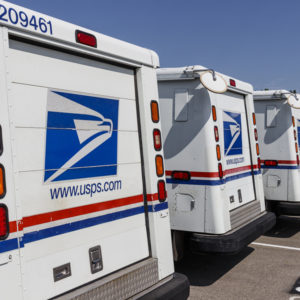Throughout the pandemic, Americans have seen up close and personal the dedication and commitment of the United States Postal Service and its 633,000 employees. While small businesses and restaurants shuttered their doors, schools transitioned to virtual learning, office buildings closed, the threat of COVID-19 raged, and our way of life was upended, the Postal Service never stopped. It continued to deliver mail and packages to every address in America six or seven days a week. This wasn’t a business decision made by leadership at the USPS. It was a commitment based on the Postal Service’s constitutional obligation to keep our country connected. And it did just that.
As a result, Americans turned to online shopping for crucial items such as toilet paper, prescription drugs, and hand sanitizer, but also for items that made working and learning from home more manageable like coloring books for toddlers, headphones for teenage students, and even board games and yard games so families could find (or rediscover) ways to have fun at home. Americans also came up with creative gifts to send via mail for a virtual birthday celebration or sent handwritten notes to let loved ones know they were thinking of them. All of this was made possible by the Postal Service and its commitment to deliver those items together every day.
The Postal Service also lent a hand to small businesses and retailers that pivoted to e-commerce as a way to survive the lack of foot traffic. As a result, many small businesses now have robust online shopping businesses that rely on the Postal Service for delivery. More than 99 percent of American companies are small businesses, many of which have had the opportunity to go online because of the reliable and affordable support that the USPS provides. The Postal Service has been a critical component for our economy since the start of our republic, but the pandemic reminded Americans every day about its vital role of binding our country together.
All of that being said, the Postal Service has needed reform for far too long. In a rare instance of bipartisanship, Democrats and Republicans in the House and Senate recently introduced the Postal Reform Act, legislation that would help put the Postal Service on the right financial footing while also ensuring that its core mission to deliver mail and packages continues. One important provision designed to create certainty for the American people and businesses and efficiencies for the Postal Service’s network ensures that mail and packages will continue to be delivered together six days a week to every address in America. Simple as that.
There have been rumors in the past of eliminating service to five days a week or to restrict what the Postal Service can or cannot deliver, so this should be a no-brainer, non-controversial provision for everyone. Except, of course, UPS. UPS, a competitor of the Postal Service, wants nothing more than to find ways to prevent the Postal Service from creating efficiencies in delivering packages to Americans to give themselves a competitive advantage.
UPS abhors this provision, the certainty it would provide, and the efficiencies it would maintain for the only package carrier mandated to deliver to Americans in every ZIP code: the Postal Service. It’s tried for years to kick the Postal Service out of the package business to jack up rates, forcing us all to pay more for less service. UPS is leveraging all its power, money, and connections to strip this provision out of the bill. It is the dark side of Washington that Americans despise.
Fortunately, a bipartisan group of Senators is working together to preserve six-day service for the Americans and businesses they represent, not special interests. By passing the Postal Reform Act, Congress can ensure that small businesses and families across the country can continue to rely on the Postal Service to make deliveries reliably and affordably to all Americans.

